In October, 2022 my wife and I took a trip around Zakarpattia. This is the most southwestern region of Ukraine, close to Hungary, Slovakia and Romania. It’s quite a large region, with a significant part in the mountains. The name is often called Transcarpathia in English, essentially “after mountains”. It has historically been a region with a lot of Ukrainians, in addition to Hungarians, Slovaks, and Romanians, changing hands in ownership quite often.
We started off going to Mukachevo. This a nearby city to Uzhorod. I’ve been there a few times, it’s a lot less artistic and charming than Uzhorod (sorry Mukachevo). There is more of a sense this is a bit of an overlooked town, with a higher prominence of tracksuit-wearing kids and beggars hanging around. This isn’t to say it is not worth visiting. There is a gorgeous castle and cute central streets with its very central European Austro-Hungarian architectural style.
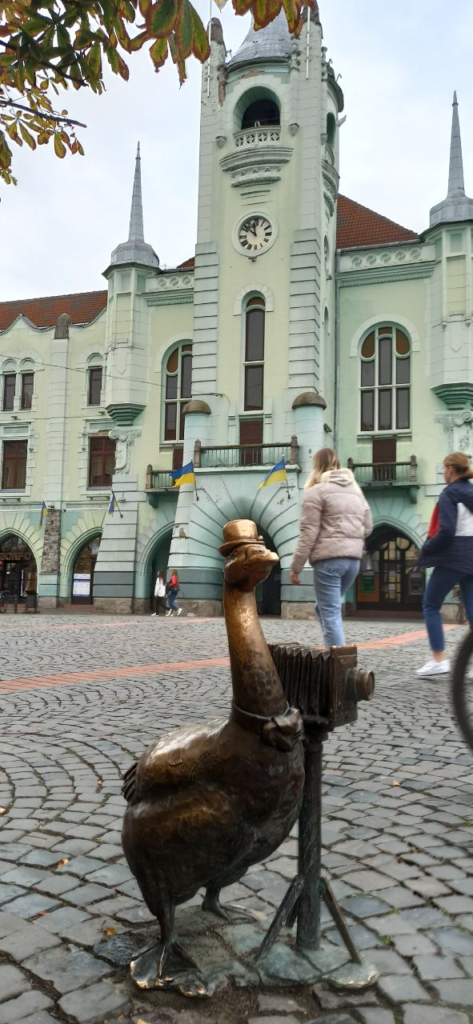
It is just that there is a darker side to it. When I came here once, a local guy, an older gent from USSR times, told me how there are schemes where desperate souls from central Asia and elsewhere pay, what I assume are Mafias, to get them to Ukraine, and get them an EU visa. Some, apparently, are “legitimate” in that they do, eventually, get a visa. Other traffickers just get them to Mukachevo, abandon them, and take their money. What can they do? I learned this before the crisis on the Belarus border, but I feel a lot of the time people exploit the lack of understanding of EU visa laws and Ukraine/Belarus not actually being in the EU. People think “Europe=EU” without understanding that you are now just stuck in a country without understanding the culture or language perhaps. Kazakhs in Mukachevo cans speak russian to locals at least, but if you’re from a middle eastern country, you might really struggle.
I learned that there was some famous criminal, who was known not just in Ukraine or post soviet world, but in Europe (yet my googling has been inconclusive so far). He was a big criminal, with a lot of money, but because he was a bit of a big fish in a small town in Mukachevo he went around without security or bulletproof cars. One day he was shot by two guys with AK-47s. Nonetheless, people wanted to be like him. They aspired to crime. I don’t know how big a factor that really is, but it perhaps indicates that for towns near the borders of the EU, with not a lot of other prospects, crime is an attractive option. Yet if you are now scared to visit, you are foolish. Like anywhere in the world, organised crime is present. Yet as a tourist, you will never have to remotely deal with or see it. Have you been to London? Paris? They have way sketchier areas (because, duh, they’re massive cities). The most you will see in Mukachevo are beggars or maybe some drunk gopniks having an argument. I honestly feel focusing on such crime plays into a negative stereotype of Ukraine and Eastern Europe in general. The reality is far from the portrayal, but yeah, of course there has been crime in the country, especially in the wild 90s. Things are different now though, like all of Ukraine.
Mukachevo has one of the best places for Bograch. This is a soup that is throughout Zakarpattia and also the Carpathians in general. It is very similar to goulash, but more of a stew. It’s a hearty and meaty soup, with chunks of various types of meat (including sausage) and lots of paprika. In Mukachevo, in the centre, you walk through what seems like an unnecessarily large entrance hall, through a garden, and into a restaurant. There you can have bograch in a tin bowl heated by a tealight candle. The soup is greasy, yes, but in a very comforting way. It is a soup for sustenance, for warmth, for your soul. A unique and authentic expression of a mix of cultures that is as much a representation of Ukraine as it is of Zakarpattia.
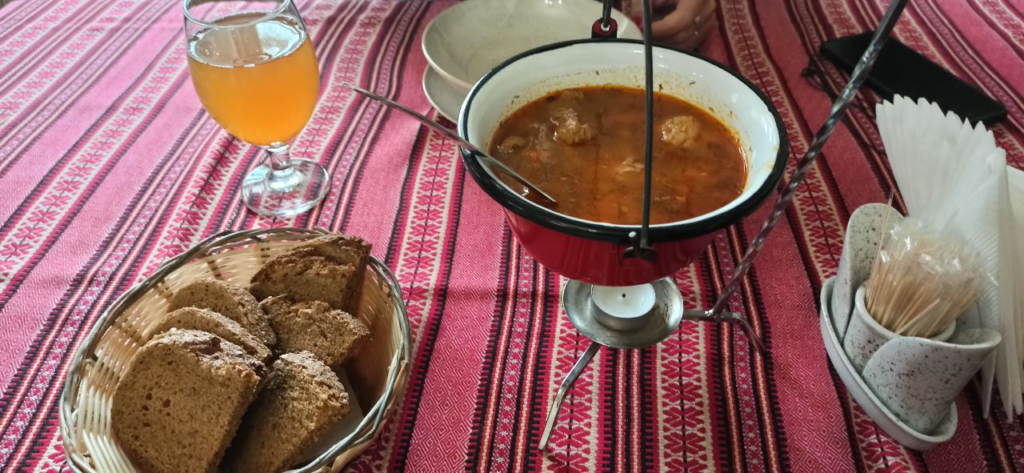
After Mukachevo we proceeded, via rental car, to the next destinations. We were in pursuit of wine. Wine is made throughout Zakarpattia, as a lot of it is flatter after the mountains and there is a micro-climate. Unlike much of Ukraine which can face -20 in winter, the temperature isn’t quite as cold on average. It facilitates a good degree of grapes and winemaking. Now, a lot of Ukrainian wine is typically sweeter than what we western Europeans are used to at least (or younger people, my grandmother only drank sweet rose or white which was typically German). However, if you go to proper wine tastings, you can try quality, dry wines, made locally. Some ‘semi-sweets’ can also be very nice even if it’s not usually what you go for.
We first drove to Chizay winery. This is a well-known wine brand in Ukraine. First, the sirens went off. Not that we heard but the phone notifications let us know while driving. We saw a woman standing outside smoking and thought they were closed. No, it was all fine. But, we couldn’t arrange a tour unless we called a number and booked. Even though we, and other people, were there for a tour, of the winery. So we called the winery we were already at, and found out a tour wouldn’t be for another two hours. We decided to continue, there would be plenty of other places to go.
My wife found, on Google, a small winery that was around 20 minutes away. The roads were, to be blunt, dire. This is a problem across Ukraine when you get off the main roads (sometimes even on the main roads) where potholes abound. Nonetheless, we found a small village with one shop and this winery. We entered a courtyard and no one was there, however, eventually we found the man. Went by a name like “Uncle Vasya”. He proceeded to take us into a small room with barrels for tables, wine glasses, and a strong smell of grapes and wine permeating the air. We were the only ones there.
We immediately understood he was desperate for visitors at this time. Tourism is a major part of the economy in Zakarpattia, including from abroad it turns out from talking to locals. This took a knock in Covid times, but more so now, as local tourism was less common. Despite my protestations that I was driving, he would pour masses of wine into my glass for each sampling. I would take the tiniest sip, most of the time anyway, and pour the rest away. It just felt wasteful. While I know having a glass of wine is acceptable for driving if you have eaten, in Ukraine now, if you have had anything to drink while driving they can take your car to the army. Which is absolutely fair, but I do not fancy that with a rental. Back to the tasting, I didn’t love the wines, most were very sweet for me. He did however tell his whole story. He worked at a famous winery and basically took the recipes and decided to do them himself. He also makes liquor and cognac and was hoping to turn part of the winery into a museum, with a mass collection of objects. I struggled to understand him as he spoke fast and himself drank large glasses of wine for each of our samples. My wife had to translate much of this later. He forced shots of liquor on us, despite the fact, again, I couldn’t drink and my wife doesn’t like strong alcohol. Nonetheless, it was a delightful time at this winery merely to gain insight into the world of a winemaker in Zakarpattia. I hope that after victory his business booms and he can regale more strangers with his tales.
After this winery, we proceeded to Berehove. This is a larger town in the region that is a stone’s throw from the Hungary border. Most people in this town are fluent in Hungarian, and some of the older generation when they speak Ukrainian often mix it with Hungarian and Russian. Shops have signs in Hungarian alongside Ukrainian, and Hungarian flags sit alongside Ukrainian and EU flags. I have learned that many people from these regions, who were eligible for Hungarian passports before as they spoke the language, have reaffirmed their Ukrainian identity, feeling betrayed at Hungary’s response to russia’s invasion. Applications for Hungarian schools have decreased, and Hungarian is more a language than a part of identity. For many, Hungarian passports were just logical, they gave you EU access and the ability to go to the USA. Yet now, people feel more decisively Ukrainian. It is funny how Russia planned to exploit these divides in Ukraine and yet did more to bind people together than anything else could have.
We drove through Berehove, after unsuccessfully trying to find some special glass bottles that we saw in the winery, and proceeded to the next winery. However, as we exited the town we saw a hitchhiker. My wife hitchhiked in many countries, and I have done it a handful of times, so we are always willing to give people a lift. This was an older woman, heading to some village nearer the Romanian border. We explained where we were going, and that we’d stop in a winery, expecting her to want to get out there, but she said she would join us.
It was around this time the sun came out, and illuminated the gently rolling hills of Zakarpattia. I couldn’t help but think this is a region more people should come to. Come, try wine, hear many languages, and immerse yourself in a unique region where central and Eastern Europe meet. Ukraine has been referred to as the gates of Europe, or the edge of Europe and the like. Zakarpattia truly feels like that. Go one direction, through the mountains, and you feel that you were heading towards a more exotic region vastly different from central and western Europe, yet Zakarpattian villages and towns are more reminiscent of Czech, Slovak, or Hungarian villages, due to the Austro-Hungarian architecture and geographic aesthetic.
The hitchhiker turned out to be from Kharkiv (the biggest eastern city not under occupation). She had two houses, now damaged, yet she came to Zakarpattia and fell in love with the region. Though her new town of residence was more in the mountains proper. She was an older woman, mid-fifties perhaps. She spoke russian, which I struggle with much more than Ukrainian, so I could only understand the smallest of snippets. Nonetheless, she seemed interesting. We eventually got to the next winery. There were fields of grapes adorning the small road leading to the large house. We got out of the car and proceeded inside. This was a long-standing wine-making family who owned it, yet relatively they discovered an ancient wine cellar, where they now keep the barrels. Or something like that. Similar to others in the region, they make a range of wines, liquors, and cognac. The cognac in fact was reminiscent of Jagermeister, so if you like that, but want a bit more sophistication in the taste, then it is ideal. The sampling was more to my tastes, with excellent dry and semi-sweet wines, generally feeling, to use the word again, sophisticated compared to uncle Vasya (personal preference). The host kindly explained the processes and their history and was able to explain word equivalents in Hungarian, as many around this region can.
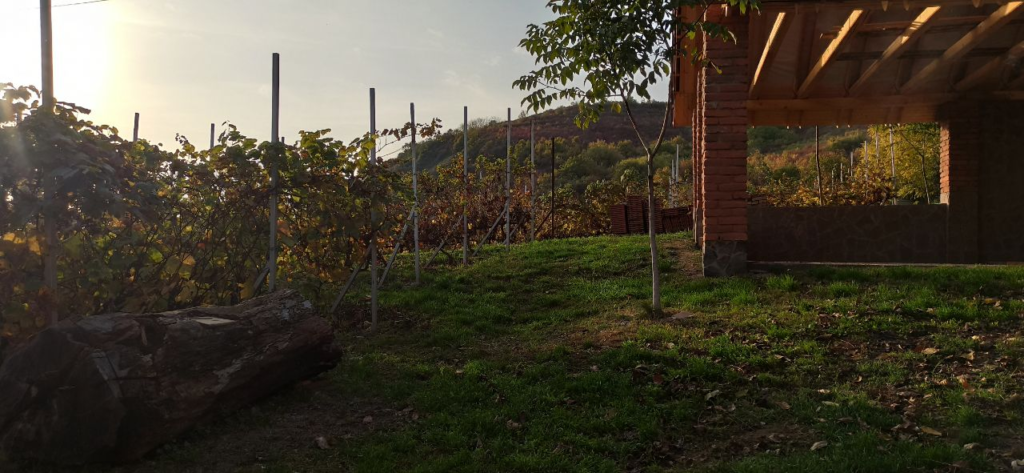
Outside the sun illuminated the golden fields and continued to emphasise the beauty of this region, often overlooked even by Ukrainians. But, it was time to proceed to Vinhoradiv, a town that is literally named “Grape town” or something along those lines. This would be a stop before heading to our final destination of the day, Khust. We had bought some wine, and the hitchhiker, some of the jaeger-like cognac.
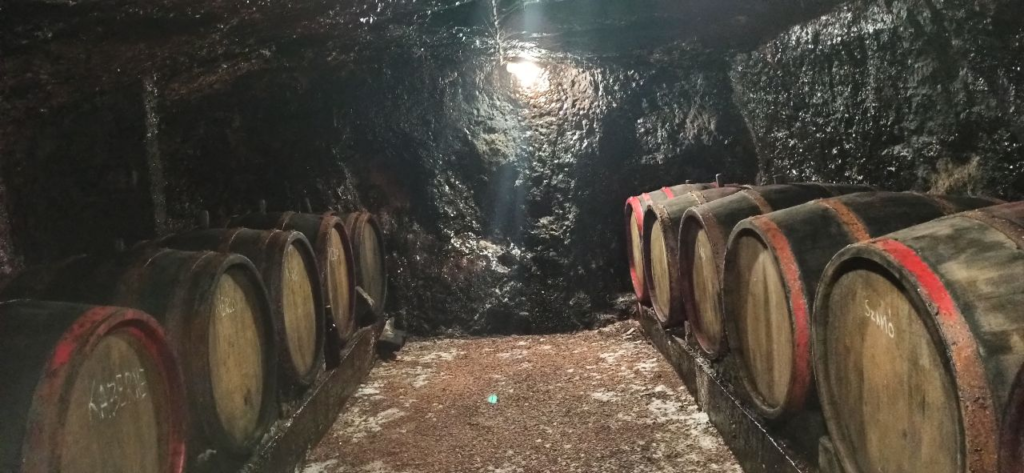
In the car, the hitcher enlightened us something about her name, which when combining the first and second names in Ukrainian becomes a word in Russian, which meant “toy”. She was also an energy healer, and wanted to create a place for kids or something in Zakarpattia to emphasise the play in words present in her name. She was diagnosed with stomach cancer and given a bad diagnosis, allegedly healing herself when she came to Zakarpattia. This was the story she gave anyway, I can’t quite understand the timeline, therefore. In the car, she took a phone call and said that she was “free” and coming home. We later found out in Berehove, where we got her, is a psychiatric hospital, so it is possible she was actually discharged, or maybe even escaped, from the hospital. Or not. I don’t want to draw conclusions, but this is what people said to us.
Nonetheless, we dropped her off in Vinohradiv. The clouds had come in and it looked as if rain was on the way. We wanted to see the castle. Well, I wanted to see the castle. I love castles and always have since I was a child. Who doesn’t love an old building where your imagination can go wild to picture the past? Anyway, google maps decided to take us up to it but the road for the last 200 metres was one of the loosest definitions of a road I have ever heard. It went uphill, was very pebbly, and full of holes and mounds, so we eventually parked almost vertically and walked up. Took some photos of the view, and saw the very bare ruins of the castle, which were effectively a load of walls left, with a vista of Vinhoradiv. What was interesting about this town was that, unlike others in Ukraine, there are no big tower blocks. No, it’s just village house after village house, but on a bigger scale. A church, this old castle, some shops, and cafes. Nothing very significant. I know someone from there, and she said that everyone either leaves or has children at twenty. I am not surprised, as someone who grew up in a small town myself.
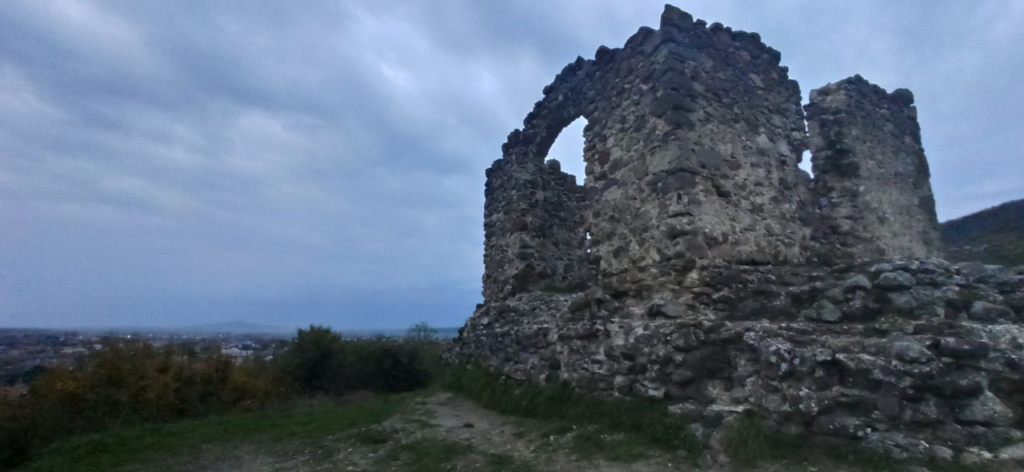

We pressed on to the last destination. Now, at night at this time, the streetlights were not working due to power allocation, making it more treacherous. We did see the hitcher again, but we wouldn’t have been much help then. A side note: Everyone says you cannot hitchhike in your country, town whatever, but it always works eventually. It just takes time. I am sure an older woman wouldn’t have too much of a problem.
Khust didn’t strike us as a particularly exciting town. A factory, some straight streets. We found a hotel where the host couldn’t comprehend I did not speak russian and made some insults. The room was small, and overheated, and the bed was the creakiest bed I think I have ever encountered in nearly 30 years of life and after visiting 23 countries. But, it was cheap, and it would do for a night.
We went to a restaurant down the road. We wanted to go to the centre itself, as we were a bit out of it, yet with the dark, it wasn’t ideal. The owner of the hotel insisted it was very dangerous, but people everywhere insist everything is dangerous in their town. I’ve had people tell me not to “walk there at night” in the safest places I’ve been in the world. People worry about you as a foreigner a lot of the time, which is nice, but I generally am fine, though I accept that maybe I am lucky.
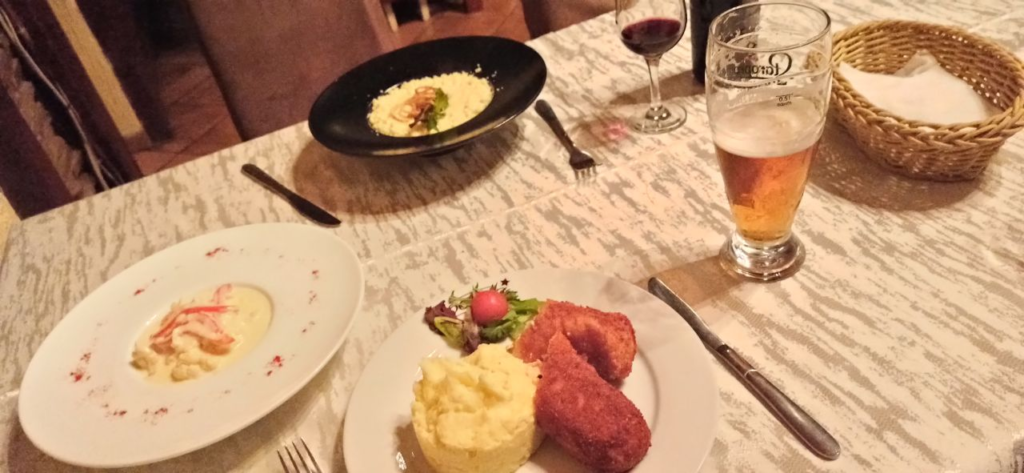
The restaurant was entirely empty, however, the food and service were excellent. My wife had the homemade wine however and it was dire, so we had a bottle of Georgian wine, much more superior. After that, it was time for bed and onwards. In terms of food, it was typical Carpathian fare. Mashed potato, paprikash (creamy sauce with paprika and meat of some kind, usually chicken or pork- imagine a more paprika heavy version of stroganoff I guess). However, the quality was very high as was the presentation. It was not a typical rustic restaurant.
The next day, after eventually finding one place that considered selling breakfast at the early hour of 10 am, we head off. It does seem that in smaller less touristic places, they typically rely on groups who book in advance. In some villages that I have been to, the idea of random people walking in and wanting food is treated as a bit of an anomaly, and the staff resent having to serve you. This isn’t super common, but it is definitely real.
The first destination was a village near the Romanian border. Khust is at the beginning of the mountains, and it’s closer to Romania than the destinations the previous day. It isn’t the most exciting place, it’s just a hub for the local villages and on the way to the Carpathian mountains proper.
The drive involved our first document check. This was a theme of our journey along this road which ran parallel to the Romanian border. Basically checking no one is escaping the country illegally I suppose. All they wanted was our documents, and I think once they saw my British passport I was all fine. A lucky feature of my life.
This village we were going to, whose name I have forgotten, had two main draws. One is the local water from the spa. I’ve been to a few spa locations, such as Truskavets, in Ukraine. They often have resorts and spas. They often have these strange little soviet buildings where you come and bring a bottle to fill it with natural water. Of course, you cannot get a bottle there, no, and they charge you the privilege to use it. This is not the case in all these towns, nor other post soviet spa towns. Borjomi in Georgia is a great example, where you can come and have some rather warm water for free. I didn’t enjoy it but it is free.
In addition to the natural water was some cave thing we saw on the map. We walked through the wet and muddy trees and up the path, and found a rather underwhelming old quarried area, with some small caves du into the cliff. It was too wet and muddy to climb down the steep bank to get it.
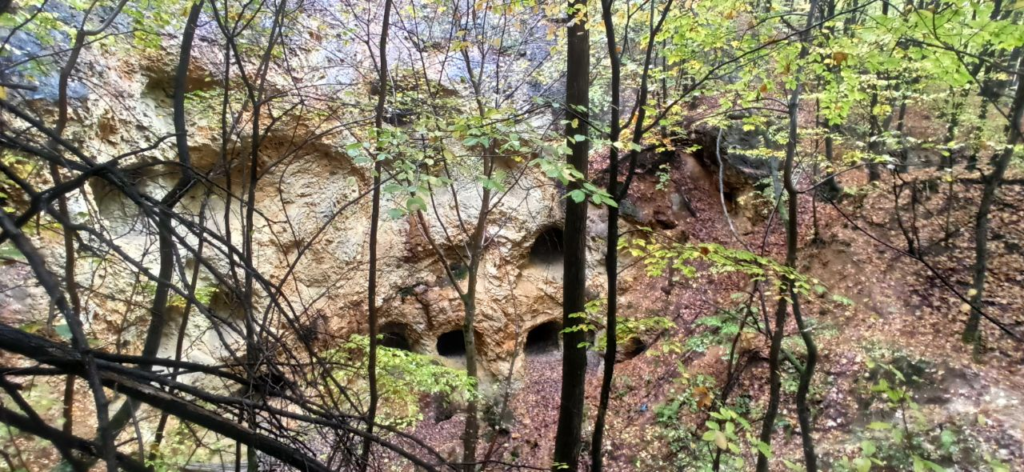
Next, it was off along the road. We were heading towards a town which is famous for its “castles” or rather, big houses that are modern yet pretending to be castles, a bit like those “McMansions” I guess you see in America. It has been also referred to as a “gypsy town”, not in the stereotypical way when people discuss makeshift towns or Roma camps, or those towns abandoned by authorities like In Slovakia and Bulgaria. No, it is that, allegedly, Roma people built giant houses here with the money they made from “something” (I have no idea whether the implication people may make, rather uncharitably, is that they make real money from begging or if it’s crime. No idea, I do not know enough to comment, but this is what people told me. It is true that this region has a lot of Roma people. I also suspect due to the growth of these large houses, other people also came to build mansions.
As we drove, basically along the mountains, we were struck by the colours. If the day before was like the end of a summer’s day in perpetuity with wheat and grape fields illuminated by the evening sun, today was dark, grey, and rainy- just like home in England. However, the colours of the trees were almost overwhelmingly beautiful and offered a stunning contrast compared to the grey skies.
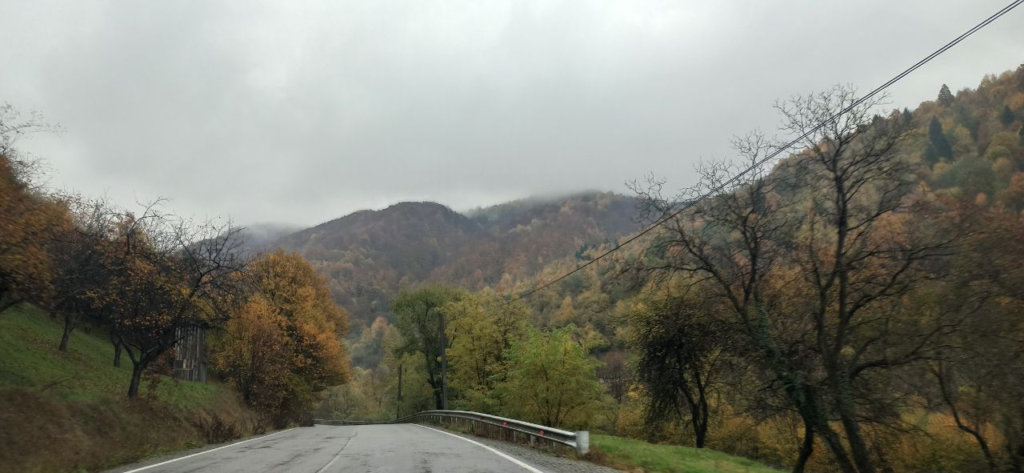
The town, when we got there, did indeed consist of many large houses. We drove around and eventually made it to the centre. Popping into large supermarkets, which are full of European goods, the locals did not know what language to speak to us. This is because many of the locals, while some spoke Ukrainian, many were speaking Romanian. It was interesting as well, that there were flags in some of the villages from Hungary, and this one, Romania. True diversity within Zakarpattia. In this town, it felt like another word though. Old people walked around, down the middle of the road slowly as possible, having a natter with people I presume they’ve known their entire lives. Perhaps new people come to buy and build massive houses, but I could tell this is a long-standing town and population. It does not boast much n the way of places to eat, rather “Jony’s Pub” where we had coffee, a church, and a few supermarkets.
Going on the road we faced more and more checkpoints, a blip in road quality where half the road did not exist, so I had to drive on the other side, and more vibrant and burning colours of trees. Eventually, as we shifted from the border, heading north, there was less need for checks. We decided to stop at the “geographical centre of Europe”. This is supposedly according to the Austro-Hungarian empire, and in researching this, no one knows the parameters as to how some random bit of Ukraine became the centre, but it is. In fact, it’s not even that centre, the monument is quite a way from what they declared in terms of coordinates, but they put the monument along the road, for some reason. Either the stone was in the actual spot, which is in the middle of the mountains, or they put it where people could see. I cannot find the answer despite my best research efforts.
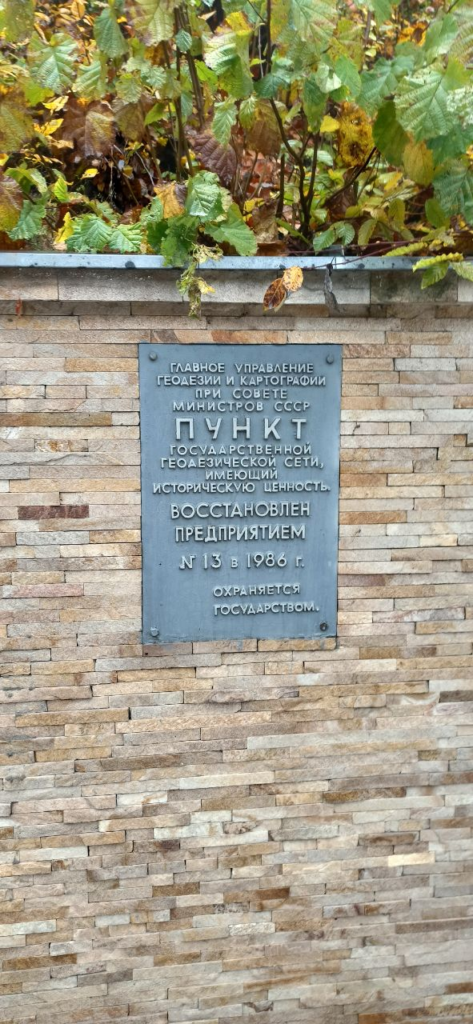
After that, it was finding a restaurant where I could take a work call. This place we took a risk on was very typical remote Carpathian style, with terrible and slow service, bograch soup and other typical dishes (hey I am not complaining about it, just saying it’s typical), wooden outside seating area, and vyshyvanka dressed waitresses who ignore you. There were also some local politicians who, from what my wife told me, were brazenly talking about who to bribe to buy a forest and generally acting like dicks, drinking lots of vodka at 2 pm.
The final destination of our day was Bukovel, which is a famous ski resort town. It is huge, and right in the heart of the mountains. To get there involved crossing into Ivano Frankivsk oblast, no longer Zakarpattia. This oblast was once called Stanislaw, or Stanislau, part of Poland-Lithuania, Austro Hungary, Western Ukrainian republic, Ukraine, Poland, then soviet Ukraine, then independent Ukraine. The name changed in 1962 to reflect the famous Ukrainian poet, writer, and politician.
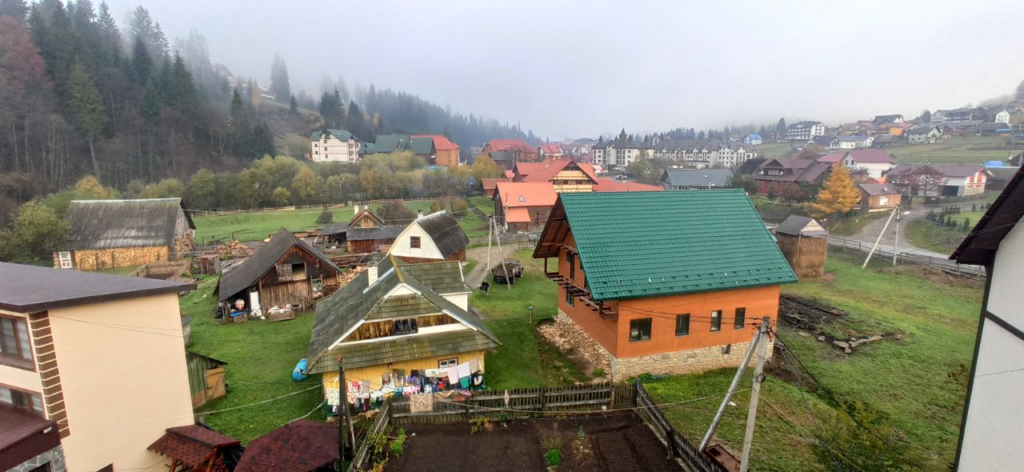
The hotel had a spa and was perfectly decent. However, Bukovel is a slightly surreal place. It has been almost entirely built around a few old village buildings, which are still there, and spread throughout a vally. It has literally everything you could possibly need, and it has its own electricity it seems, being one of the few places with streetlights. It mostlys consists of restaurants, hotels, many many official Bukovel activities (mostly skiing, luges, water sports, sledding, etc) but also other things, dentists, massages (even “erotic” ones as we saw advertised), and anything you could want. If you love skiing it is a great place in winter. It boasts many hotels, so it is useful. However, it doesn’t capture authenticity, whatever that means, to me anyway. Yet, it is absolutely the peak of convenience.
The next day involved exploring Bukovel off-season. It is strange to see so many people effectively having a holiday during a war. It makes sense, the war has been on for several months. Life continues. I know people back in the UK and elsewhere will go “Oh, having a holiday in a war? Can’t be that bad!” as if the constant fear of something landing on your house or destroying your quality of life isn’t bad enough. Did people in the UK not take trips during world war two? Do people in Syria, Iraq, and Afghanistan, not do things for leisure? We truly need to understand that war isn’t everything, even if it affects everything. Also, Ukraine is big.
My wife did see Arestovych go past us on a ski lift. I missed it, instead looking at how I needed to clean my shoes. I wish my wife said, “it’s two, three weeks to get up to the top”. Missed an opportunity.
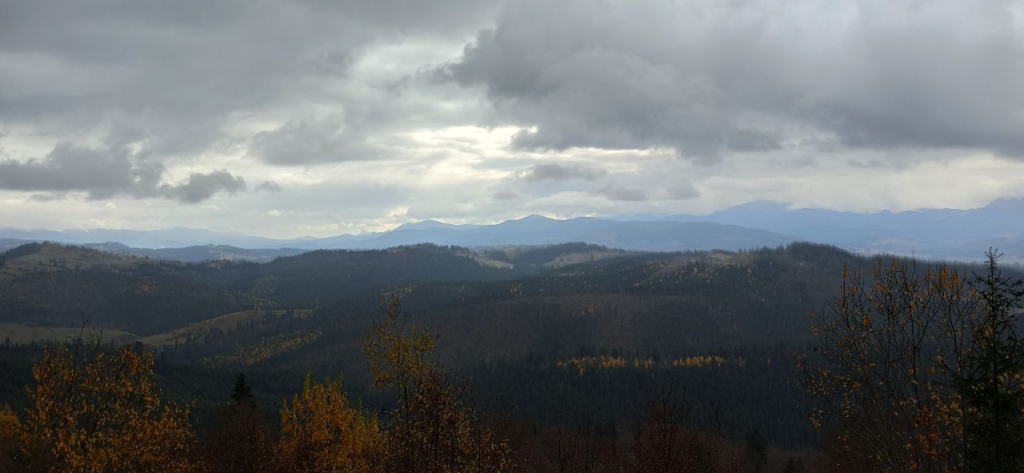
After the day, we drove off to Yaremche, a village around thirty minutes away. We have been here a few times before. There are several villages along the main road that people stay in for holidays. For our honeymoon in fact we stayed in Tatariv. Another time we stayed in Yaremche. On the way, we stopped for lunch in a nice restaurant. Before we tried to stay in another restaurant, but, unless we were part of a big group who arrived via minivan, we could not eat there. These strange experiences in Carpathians.
We found the hotel and after not long the power went out but we had to do work. Juggling the battery life of our laptops and phones, and power banks, we managed in a dark room. We were glad we prepared by bringing candles and power banks. On the topic of the war, what was interesting is that no one here gives a care in the world about the sirens. In Uzhorod and other main towns, they close as the law dictates when the sirens go off, even though the odds of a strike are very low. In the mountains, they do not give a fuck, to be honest. Just as many didn’t care about covid. The world does feel far away when you are in the mountains. I have to remember most people’s lives revolve around their village, the nearest big town, they walk along the road with no pavement, slowly despite the speeding traffic, ride bikes, go to school and church, and do some work, presumably.
Driving is interesting by the way as a result. Most of the Carpathians are based on around three or four main roads that run through, and towns lay along them. Off these roads are worse roads to remote villages, farms, or places where you can go hiking or whatnot. These are the hazards you will encounter: suicidal dogs, chickens, goats, cows, people having funerals and marching down the road (which you cannot, tragically, know if it is something from the war or not), kids on bikes, and old people meandering down the road. Oh, and other drivers. People in Ukraine are not quite as extreme as drivers say in many parts of Asia, or caucuses. However, in the Carpathians they remind me of drivers in Vietnam. They basically go where they want, and stop when they need. Signals, slowing down, nah, just go where you want and stop. Everyone else can keep an eye. Oh, and of course they drive very fast, to then walk slow. I’ve noted a correlation that the slower the region, as in its vibe, its general approach to work, the faster they drive. Maybe it’s nothing. But I like to joke they rush fast to do nothing for longer.
The next day, the plan was to go out of the mountains towards Ivano Frankivsk city, and then back into the mountains along a different road, which we would then follow home. We decided we would stop off in Kalush, the city of the band of the same name who won Eurovision this year. The drive through the mountains continued to delight us with vibrant autumnal colours. If it is not obvious, I highly recommend people visit the Carpathians in the autumn.
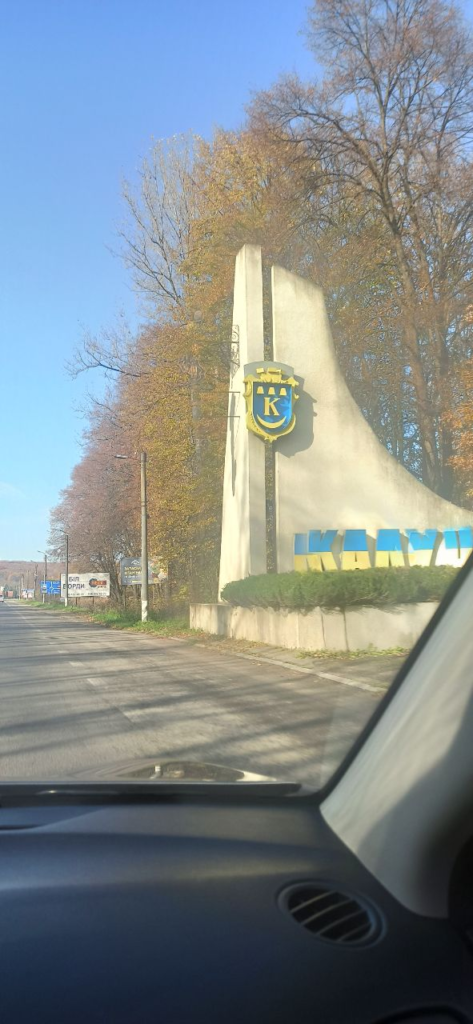
Kalush isn’t the most stand-out town, however, it has a quaint centre, with cafes around a square, and a rather interesting mosaic. We also saw a beautiful cat sat on a metal cellar door in the sun. For a quick stop, it was sufficient.
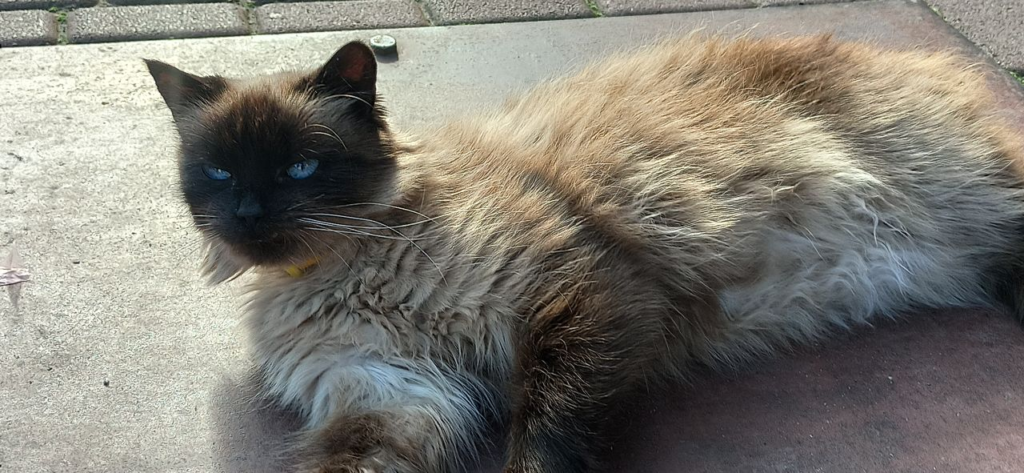
The next stop was in a random town where we saw what looked like a good restaurant, allegedly with colourful varenyky. They didn’t have these. However, the food was good, and the town had a tram that goes to a silver mine and some interesting sights in a little area that provides you with mountain views, such as a giant chair and statues overlooking the river. We proceeded and went further, back into the mountains towards the main destinations of the day: Lake Synevere and the bear sanctuary.
The most notable stop before the lake was when we stopped for a few minutes. Some men were doing some repair work. We stopped to admire the mountains looming over us, as there was enough of a clearing for a truly photogenic vista. A man was watching them work, and when we got out of the car, he came over to us. I didn’t say anything, and my wife didn’t introduce me as a foreigner, to “not blow his mind” as he struggled with the concept that she was from Rivne but lived in Uzhorod. One thing I understood was that he said there is no work here. I am not surprised. Aside from tourism, or doing general labour, there isn’t a lot of work in this region of the world. The rural-urban divide in Ukraine is major. And like villages everywhere, the opportunities are very low.
Lake Synevere required a lot of driving up terrible roads and I was expecting more. However, it is the highest lake in Ukraine. The water is pure, due to a lack of swimming, fishing, and pollution, and the stillness reflected the mountains and sky perfectly, which had finally cleared for us. My wife got a delicious mulled wine of a granny, for very cheap, and we cracked on to the bear sanctuary.
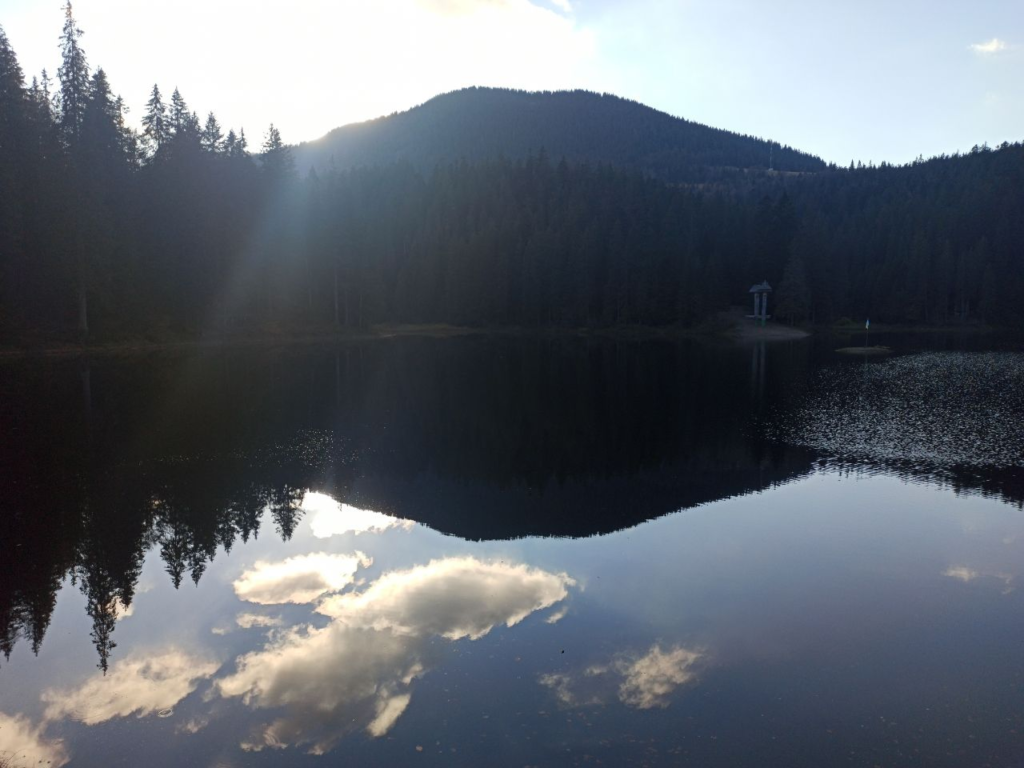
The sanctuary was great in that you didn’t see a lot. The bears have a lot of space and you can only see them on the perimeters. However, many of the bears were by the fence. They were mostly semi-domesticated, previously being at zoos, private homes, and things like that. One was put on an oven top and made to dance. The human that could make such an idea or go along with it is someone I can never understand. Yet, now, these bears are safe and free to safely enjoy the outdoors.
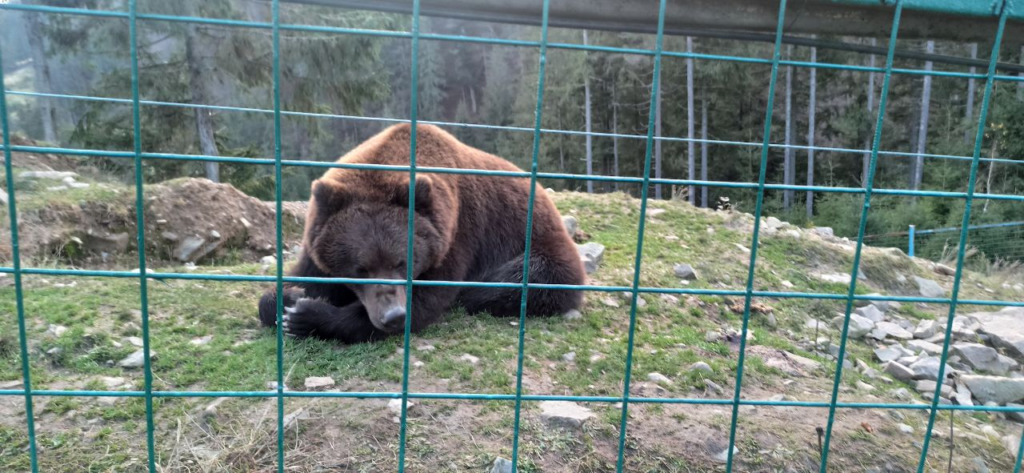
After we went towards Pulypets, a village we have been to many times for the Shipot festival, which is a discussion for another day. It required more mountain driving, and we found a Romanian radio station playing absolutely incredible but diverse English language songs.
The place we stayed, getting there in the dusk as the sun’s rays pierced over the mountains as it set, and the dark came in, was a place we came to before. Typical of some Carpathian hotels and restaurants, they decide to play music very loud outside. Not music that fits the vibe, but rather cheesy Ukrainian pop music.
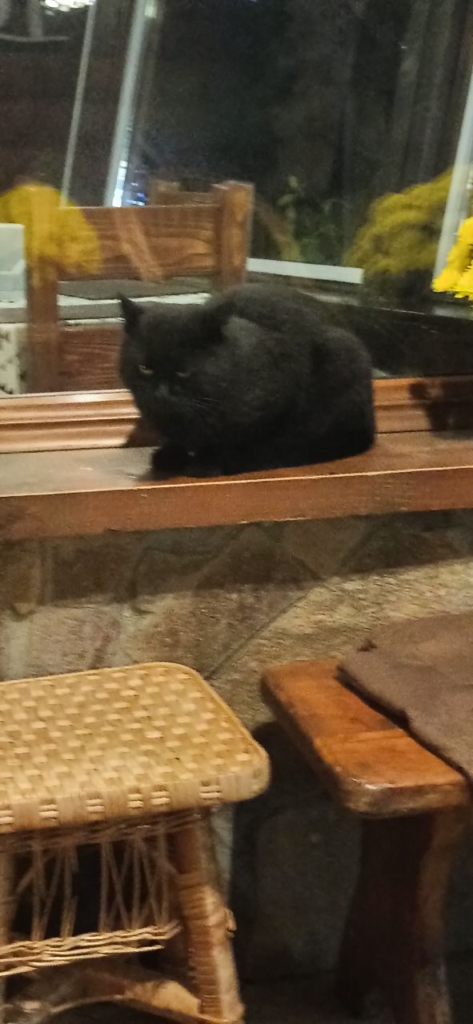
Inside it was incredibly loud, so when we had our dinner we went to the top of the restaurant which has a panorama view, That was great, as was the food, as it almost entirely had been the entire trip, yet I will never understand the loud music thing. We had breakfast at a different place the next day as from 8 am they were blasting the pop. I guess they think it attracts people, maybe it works for some, but for us, no.
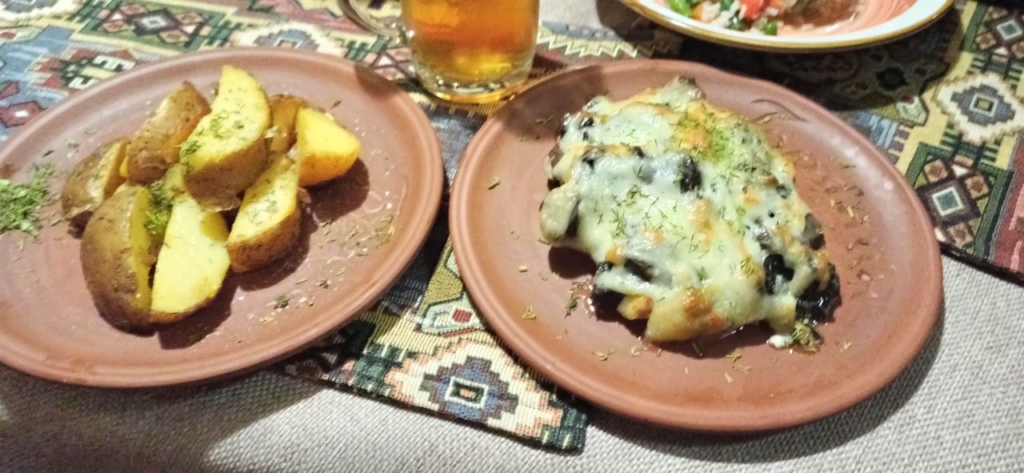
We saw the shipot waterfall and walked up to where the festival is held. Seeing the spot which is often full of people partying, in hippy clothes, camping, and having fun, quiet, and autumnal, was a welcome change to appreciate the beauty. Mountains loom over you and you feel far away from the war and the world.
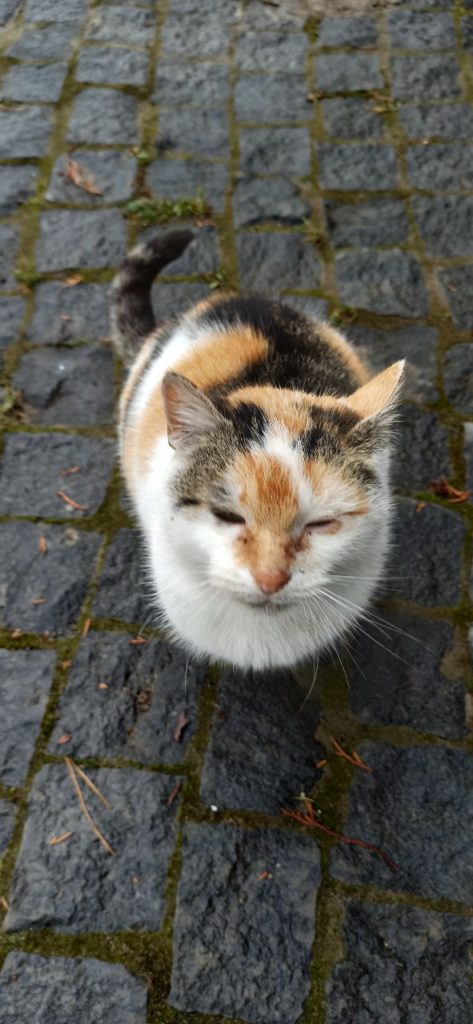
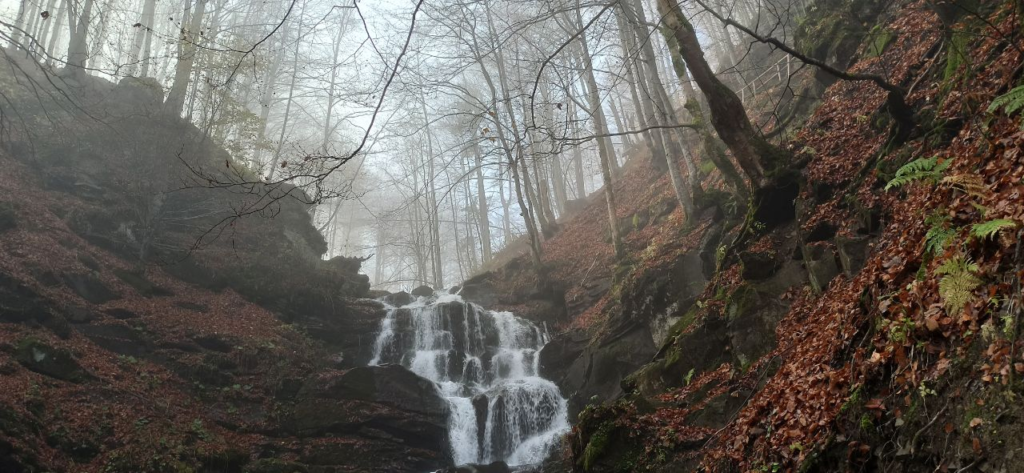
On the way home we stopped at a palace near the Karpaty village. For some reason, despite it being a beautiful historic building you cannot go inside. However, it was a cute mansion, reminding me of childhood trips to national trust stately homes. We also saw many cute cats there. That is the most I can say about the place.
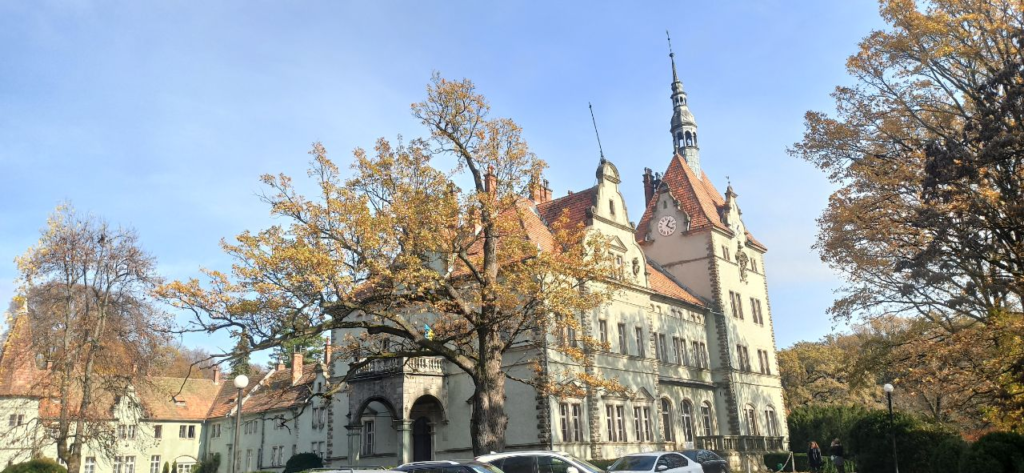
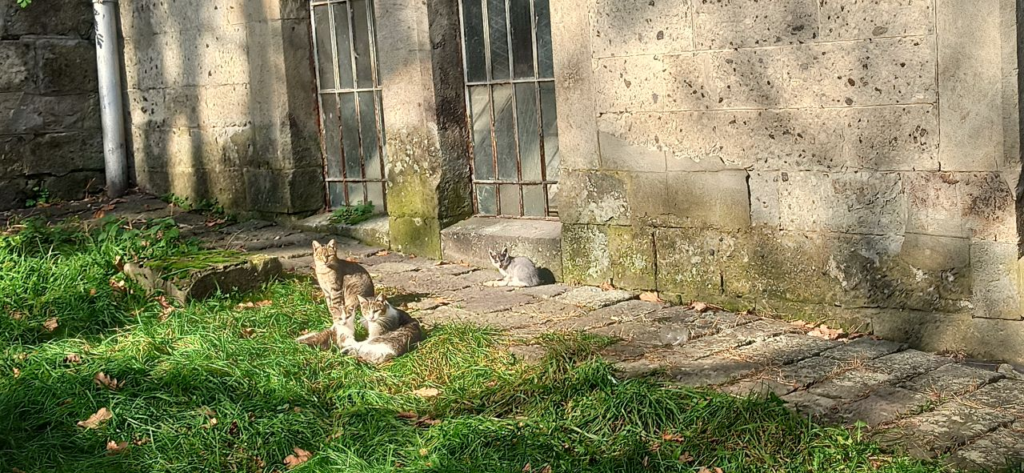
That was the end of our Carpathian journey. We had delicious and wholesome food and caught glimpses into a very different style of life, where people walk along main roads as slowly as possible, unwilling to compromise for anything and struggle for work. Artificial ski towns, Romanian-speaking towns, Hungarian-speaking towns, wineries, vibrant colours, and of course, powerful mountains. It is a world of peace in a country at war, and to experience this in these times, is something I will not forget. I await my next trip, perhaps after victory.
Leave a Reply